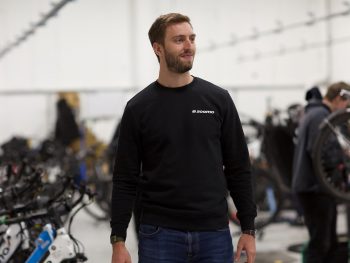By Nicolas de Juniac, UK general manager, at Zoomo – a leading platform for commercial micromobility fleets.

Running a petrol vehicle has become a financial nightmare for Europeans. The average cost of filling up a car with petrol hit £101 in the UK this summer, 50% more than the same time last year. And with increasing energy supply issues, a petrol crisis, inflationary pressures, and the ever-present threat of a global recession persisting, it is highly likely the individual cost of running a car will continue to be high.
However, the impact of this price hike will be just as bad, if not worse, for businesses. In the UK, commercial transport is an essential part of business, with 5.5 million commercial vans, trucks, buses and coaches on the road last year. A recession will hit this sector hard, and could prove fatal for businesses today. During the 2008 recession, van and truck registrations at their peak dropped by over 30% a month, giving us a potential insight into what could unfold in the next 12 months.
For businesses, particularly those that utilise large fleets of commercial petrol vehicles, the unfortunate reality of this economic pressure is that while running and maintaining a fleet of petrol vehicles was once a necessity, in the next decade it could be considered a luxury. In the current economic climate, the decision of how to get from point A to point B will be a careful one. Petrol vehicles will be weighed up against alternative, electric vehicles, and the race has never been tighter.
However, there’s a solution. Disruptive technologies like electric bikes and the advancements we continue to see in the Light Electric Vehicle (LEV) space are providing modern solutions to a range of transport needs that are helping reduce our reliance on gas-guzzling vehicles.
These technologies support businesses at a fraction of the cost. The 12% rise in e-bike sales in the UK and Europe during 2021 compared to 2020 underscores their benefit, with a significant proportion of this for commercial use.
Businesses benefit from using LEVs by the fact that recruitment to operate these vehicles is easier and less expensive, avoiding the need for driving licenses or CBTs. The savings on fines are also significant as business vehicles generate higher fines, and are hit by them twice (paying the fine and paying staff to process the fines). LEV providers have recently been turning their attention to fleet management software that allows businesses to monitor, track and save. The result of all of this is that in a recession, when businesses will be increasingly focused on saving cash, the cost benefits are likely to become LEV’s most powerful argument for driving adoption.
And although cost might be one of the most obvious reasons today to avoid cars, the benefits don’t stop there, as alternatives like LEVs are better for the planet, more accessible, and contribute to better-running cities. Each individual e-bike has the ability to slash the CO2 equivalent from cars by more than 80% per kilometre. The carbon savings entire fleets could make is beyond belief, and given that so many delivery and logistics journeys are a perfect distance for LEVs, it shows the genuine opportunity they have to make a difference.
Switching to smaller, more efficient alternatives will also reduce congestion on our roads. If businesses lead the way and where necessary move away from cars and vans, the requirement for infrastructure like roads and parking lots that for so long have dominated our cities will be reduced, all whilst making our roads quieter and safer.
What is required to make the adoption of these vehicles even more widespread is a mindset change; businesses need to re-evaluate whether it makes sense to use a 1,000kg vehicle to transport a 70kg human or a 1kg pizza or package for 5 miles (71% of all journeys in the UK in 2020 were under five miles).
The performance, climate impact and cost savings from this technology already exist; all that is missing is a nudge to get over the line.
However, if cost is the one thing that enables us to make the switch, which is perfectly understandable in today’s environment, it will be everyone’s gain, so the sooner, the better.

